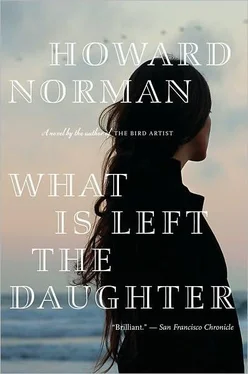Of course, Marlais, it wasn't you and Tilda. Of course not. It was some kind of mirage, you might say. Hermione noticed my expression and said, "Wyatt, you don't look so well, my friend." I said I thought I'd better see a doctor. I lay down on a cot below deck, covered by a coarse blanket. Believe me, you have to be bone tired to be able to sleep on a tugboat next to an enormous ship, a hundred seagulls complaining by the minute, the tug's engine running. Yet I did sleep. I didn't even wake when the tug tied up at Purdy's Wharf. Hermione had to wake me. She climbed down, got into our boat and rowed it in, and I went directly ashore and walked home. I couldn't shake the mirage out of my head, though. I mean, Marlais, it was the strangest thing.
I was still rooming at the Homestead Hotel, and when I stepped into the lobby, no doubt looking more like a rain-soaked dog than a human being, I didn't glance left or right but instead marched straight to the electric lift and took it up to my room, whereas normally I would've taken the stairs. I soaked in the bathtub, the water as hot as the hotel could possibly make it — tenants had recently complained — and then got dressed in trousers and a shirt that I'd ironed myself. When the telephone rang, it was Reese Mac Isaac. "Wyatt," she said with some alarm, "didn't you even notice? Your friend Cornelia Tell's in the lobby. She's been there at least five hours, Wyatt." I rang off and hurried down the stairs to the lobby. In the corner, on a sofa near an enormous potted plant, Cornelia was asleep under her coat. Her overnight bag was on the floor at her feet.
I lightly shook Cornelia awake. "Oh, Wyatt, thank God you're here," she said. She sat up and took my hands in hers. "Our Tilda died in Denmark, Wyatt. It was sudden and I don't know from what."
"Was she ill?"
"All I know is what the wire said. Tilda passed two days ago and is buried in Copenhagen."
"Wire sent from whom to whom?"
"Sent from your daughter to the post office. Reverend Witt happened to be posting a letter. He signed for it."
Cornelia fell into a kind of exhausted sobbing, then said, "You know, Wyatt, all the time she was growing up — and she half grew up in my bakery, eh? — I'd look at Tilda and think, She'll never leave Nova Scotia, not our Tilda. And now she's permanently in Denmark, of all places. Goes to show what I know, doesn't it? Shows what I know, which is nothing."
I tried to contact you, Marlais. I made every possible effort to get in touch. I hadn't before, but I did then. Cornelia gave me your address — did my wires arrive? Did my letter arrive? They couldn't have sufficed, but did they ever arrive?
In time I learned that Tilda had died on her way back from posting the first payment for the Learn Your Library program in Copenhagen, a six-week course, taught in both Danish and English, for people interested in becoming librarians. Cornelia also told me that, a few weeks before she died, Tilda had been in hospital for an infection of the lining of her heart.
Cornelia took a bus home that same evening.
The next Sunday I attended Harbor Methodist, and while all the other parishioners listened to the sermon, sang hymns and said prayers, I kept my own counsel in the backmost pew and held a private funeral service for your mother. For a moment, I had the startling worry that her obituary might appear only in Danish, in a Copenhagen newspaper. But as it turned out, Cornelia had written one and given it to Reverend Witt, and it appeared in his church's bulletin. It was nicely composed.
At church, I desperately wanted to avoid all the sanctimonious crap — sorry — usually heard at funerals. I began what I thought was a silent prayer, "May Tilda Hillyer rest in peace. She was the best person imaginable. She was beautiful," until I realized that I was mumbling out loud. Several worshipers on either side of me moved farther away.
You were still in the world, Marlais, very much in the world. But otherwise, in every other possible way, life felt disreputable and collapsed. After church, I spent seven straight hours out in the boat, gaffing in Halifax Harbor. The rain had stopped. The wind was manageable. As usual there was a cormorant on each buoy. I took hardly anything into the boat. A lady's hat, the feathers frayed and matted against the silk band. I wondered, had the wind swept it from a Hungarian leaving the Cascania? A toy water pistol. A window, its double panes cracked into spider webs, but the frame intact. Around dusk, near Purdy's Wharf, I saw a flock of gray geese descending. They are here year-round. I followed them in.
The last and final time I spoke with Reese Mac Isaac was on the following Sunday morning. No church for me that day. There was a knock on my hotel room door, and when I opened it, there stood Reese, dressed smartly, as always.
"I know, I'm showing my age," she said.
"How can I help you, Reese?"
"Sunday mornings I visit Katherine and Joe's graves. I'm going there now. I thought you might accompany me. Just this once."
My begging off might only have led to her insistence — though maybe I wanted Reese to insist — and what purpose would be served by not going? So we walked to the cemetery together. We stood at my mother's grave a few minutes, my father's the same, and then walked back to the Homestead.
"Except for restaurants and the cinema," Reese said, "any place I visit, I don't stay very long. Come to think of it, maybe I'll be cremated, you know? I don't want to overstay my keep, not even in a cemetery."
Once I was done laughing, I said, "Reese, you sure don't hesitate to think out loud, do you? I'd imagine both my mother and father liked that quality."
Midweek, when I'd got back to my hotel, a hand-delivered letter was waiting for me. No return address. I sat on a couch in the lobby and read it.
Wyatt,
It was kind of you to go to the cemetery with me. My house is now put up for sale. I leave Halifax today by train. I've arranged a room with a distant cousin — said cousin has secured employment for me in the oldest hotel in Vancouver — need I mention what that employment is? So, there should be no concern that I've gone off to Hollywood! I wish for you a good life.
Reese Mac Isaac
MARLAIS, WELL INTO my twenty-sixth night in a row of writing to you, I realize I've sometimes raced over the years like an ice skater fleeing the devil on a frozen river. That's a phrase from one of Reverend Lundrigan's sermons. (I've attended five in the past six months at Harbor Methodist here in Halifax.) Still, what's been true of all the intervening time between 1948, when I last set eyes on you, and this very moment, 3:20 A.M., April 21, 1967, is that I've savored each and every morsel of knowledge about you I've been given. For example, during the years you attended that small, "progressive" (your mother's word) English-speaking school in Copenhagen, Cornelia Tell provided me with your report cards.
I was grateful to get them. The report cards had substance. Your mother had copied them out and mailed them to Cornelia at the bakery in the first place. I'd rung her up when the first one arrived. "Tilda asked me to forward it to you," Cornelia said. "But I'd probably have sent it without her permission." I read each one dozens of times. I still keep them in a separate envelope. News of how you performed in school was important to me. Yet as anyone but a complete fool knows, no child worth her salt ever reveals her entire character in school, no matter how deep her allegiance to teachers or textbooks, right? So all along I naturally wondered about my daughter's whole self. What did you get worried about? What was your sense of humor like? Everything, everything, everything. I had more selfish curiosities, too. Did your mother ever begin a sentence with "Your father"? You must've asked about me, and when you did, what did Tilda say? Was there sympathy, blame, or what? Did you ever see a photograph of me? I know that Cornelia sent one to you when you were ten. Did you ever receive the official City of Halifax portrait of my gaffing crew, maybe four years ago? I'd drawn a circle around my face.
Читать дальше












